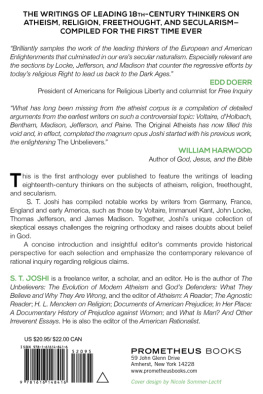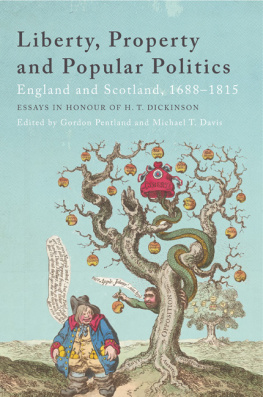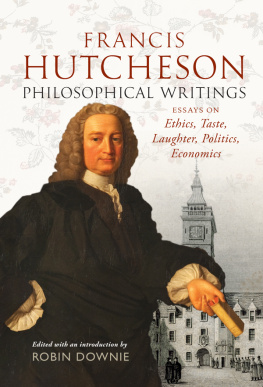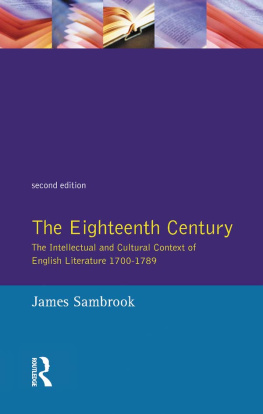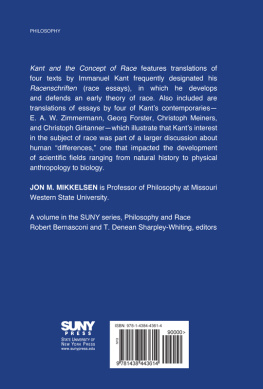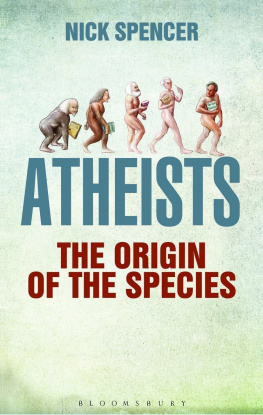Published 2014 by Prometheus Books
The Original Atheists: First Thoughts on Nonbelief. Copyright 2014. Edited by S. T. Joshi. All rights reserved. No part of this publication may be reproduced, stored in a retrieval system, or transmitted in any form or by any means, digital, electronic, mechanical, photocopying, recording, or otherwise, or conveyed via the Internet or a website without prior written permission of the publisher, except in the case of brief quotations embodied in critical articles and reviews.
Cover design by Nicole Sommer-Lecht
Inquiries should be addressed to
Prometheus Books
59 John Glenn Drive
Amherst, New York 14228
VOICE: 7166910133
FAX: 7166910137
WWW.PROMETHEUSBOOKS.COM
18 17 16 15 14 5 4 3 2 1
The Library of Congress has cataloged the printed edition as follows:
The original atheists : first thoughts on nonbelief / edited by S.T. Joshi.
pages cm
Includes bibliographical references and index.
ISBN 978-1-61614-841-6 (pbk.)
ISBN 978-1-61614-842-3 (ebook)
1. Atheism. 2. Atheists. I. Joshi, S. T., 1958- editor of compilation.
BL2747.3.O57 2014
211.80922--dc23
2013031770
Printed in the United States of America

The Unbelievers
The Agnostic Reader
Gods Defenders
Atheism: A Reader


The first atheist of whom we know is one Diagoras, who lived in the late fifth century BCE. It is typical that nothing of his works aside from random fragments survives and that he was forced to flee Athens because he declared that there were no gods. Even in the ages preceding Christianity, the enunciation of explicitly atheistic, or even agnostic, views carried with it the threat of both legal punishment and social obloquy. It is therefore unsurprising that, once Christianity gained ascendancy in the Roman Empire (in the early fourth century CE), avowed atheists were few and far between. All that changed with the dawn of the eighteenth century in Europe, and the following question must be asked: Why? More pertinently, Why now?
The answers are multitudinous and complex but can be boiled down to two important developments that had occurred over the preceding several centuries. The Renaissance that began in the late fourteenth and early fifteenth centuries generated two discrete but parallel intellectual movementsthe advance of science and the rediscovery of classical learning. The former is perhaps the better known, but it is still worth underscoring. There is scarcely any question that the revolutionary findings of such thinkers as Copernicus, Kepler, and Galileo had the effect of knocking the earth and its occupants from both physical and moral centrality in the universe. If our planet was only a tiny atom in the midst of a virtually boundless array of stars, galaxies, and nebulae, then it became harder to believe that a god had specifically designed the earth for a chosen species called human beings. Complementary developments in other sciences had the effect of replacing supernatural causation with natural causation: increasingly, God was no longer required to explain the workings of the universe or the creation and development of natural organisms. All this work culminated in the discoveries of Sir Isaac Newton (16421727), who became a kind of intellectual icon who was thought to have explained the workings of the universe once and for all. It was the deist Alexander Pope who deliberately evoked (and, indeed, gently parodied) religious imagery in describing Newtons achievements:
Nature and Natures Laws lay hid in Night:
God said, Let Newton be! and all was Light.
The second developmentthe resuscitation of classical learninghad a somewhat more indirect role in the growing secularism of the age, but it was ultimately no less significant. In the medieval era, only Plato and Aristotle were read and studiedchiefly, in Platos case, for the fancied similarities of his ethical views to those of Christianity, and, in Aristotles, for purportedly supplying the logical foundation for Christian metaphysical thought. The great majority of pagan writers from the Greco-Roman period were shunned as benighted figures who had failed to benefit from Christian teaching. Dante may have fetishized Virgil as his spiritual leader in the Divine Comedy, but less superficially Christian writers were under the ban. The Renaissance, however, had rediscovered the thought of such thinkers as the pre-Socratics (including Leucippus and Democritus, the founders of atomism), the Stoics (also in some regards considered forerunners of Christian moral belief), and in particular Epicurus and his Roman disciple Lucretius. The Epicurean belief that the gods lived in the spaces between the stars and, in their perfection, had no concern or involvement with a flawed humanity, was an intriguing hypothesis; it was not surprising that, even in antiquity, the Epicureans were considered closet atheists. It didnt hurt that Lucretius had expounded Epicureanism with extraordinary panache in his long poem De Rerum Natura (first century BCE), with lengthy sections on the utter extinction of consciousness upon the death of the body, the natural origin of human and other life on earth, and other topics that would become the cornerstones of atheistic, agnostic, and deist thought in the centuries to come. His pungent line Tantum religio potuit suadere malorum (1.101: How many evils can religion engender!) was not overlooked.
While there were skeptics and agnostics prior to the eighteenth century, they remained solitary and isolated figures: Michel de Montaigne (15331592) was perhaps the most noteworthy, his pregnant utterance Que scais-je? (What do I know?) becoming the epitome of skepticism. Let us recall that Michael Servetus (1509?1553), Giordano Bruno (15481600), and any number of other figures were executed for expressing heterodox views: any open declaration of atheism would have been a one-way ticket to the stake.
The seventeenth century laid the groundwork for the secularism to come. Galileos humiliation by the Inquisition in 1633he was forced to declare that the sun revolved around the earth, even though he knew bettergenerated outrage at such an infringement of intellectual freedom. At about the same time, Sir Francis Bacon was laying down the outlines of philosophical empiricism with such works as The Advancement of Learning (1605) and Novum Organum (1620). Thomas Hobbes, in Leviathan (1651) and other works, proclaimed a resolute materialism that saw even God and the human soul as material entities; as a result, he was frequently branded an atheist, even though he rejected the accusation. In France, Descartes and his followers championed deductive reasoning in their Cartesian philosophy; nominally, Descartes claimed that this methodology allowed for a proof of the existence of God on rationalist grounds, but his searching inquiry into the grounds for belief of any proposition, however self-evident, had broader ramifications than he himself realized. It was at this time that the tormented Christian Blaise Pascal expressed, in his Penses (1669), a searing doubt about the truths of the Christian revelation that no doubt echoed that of many of his contemporaries.

